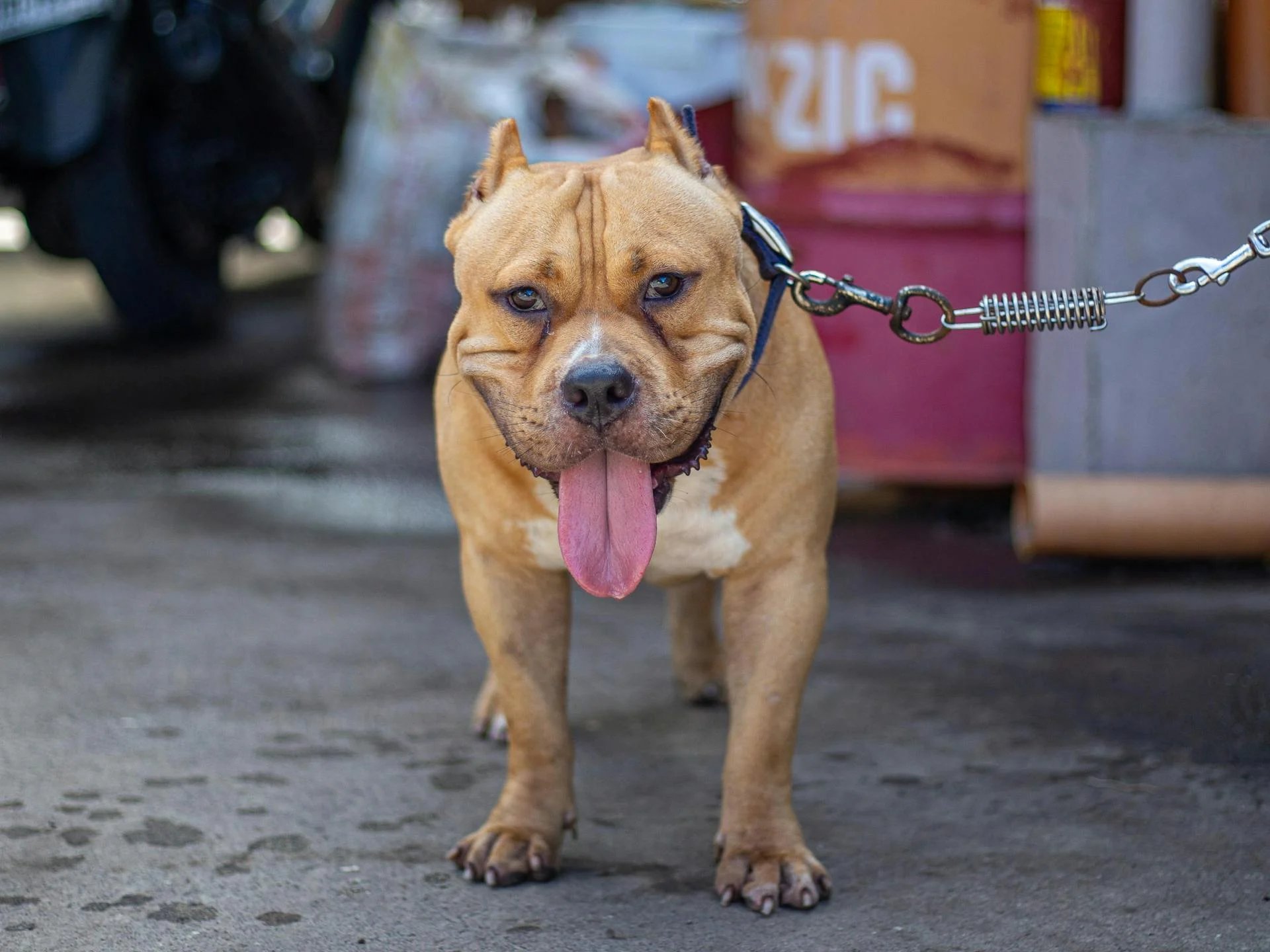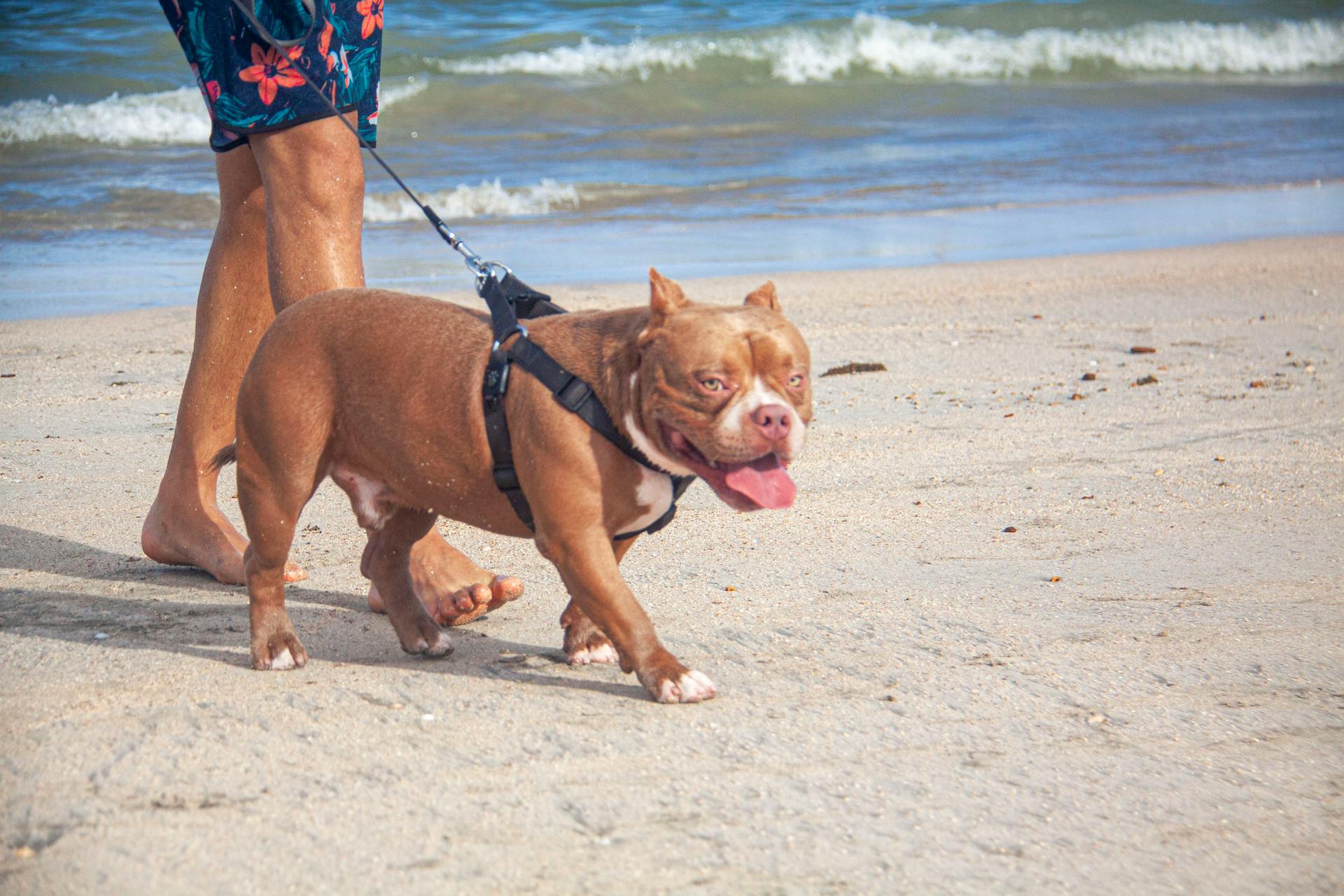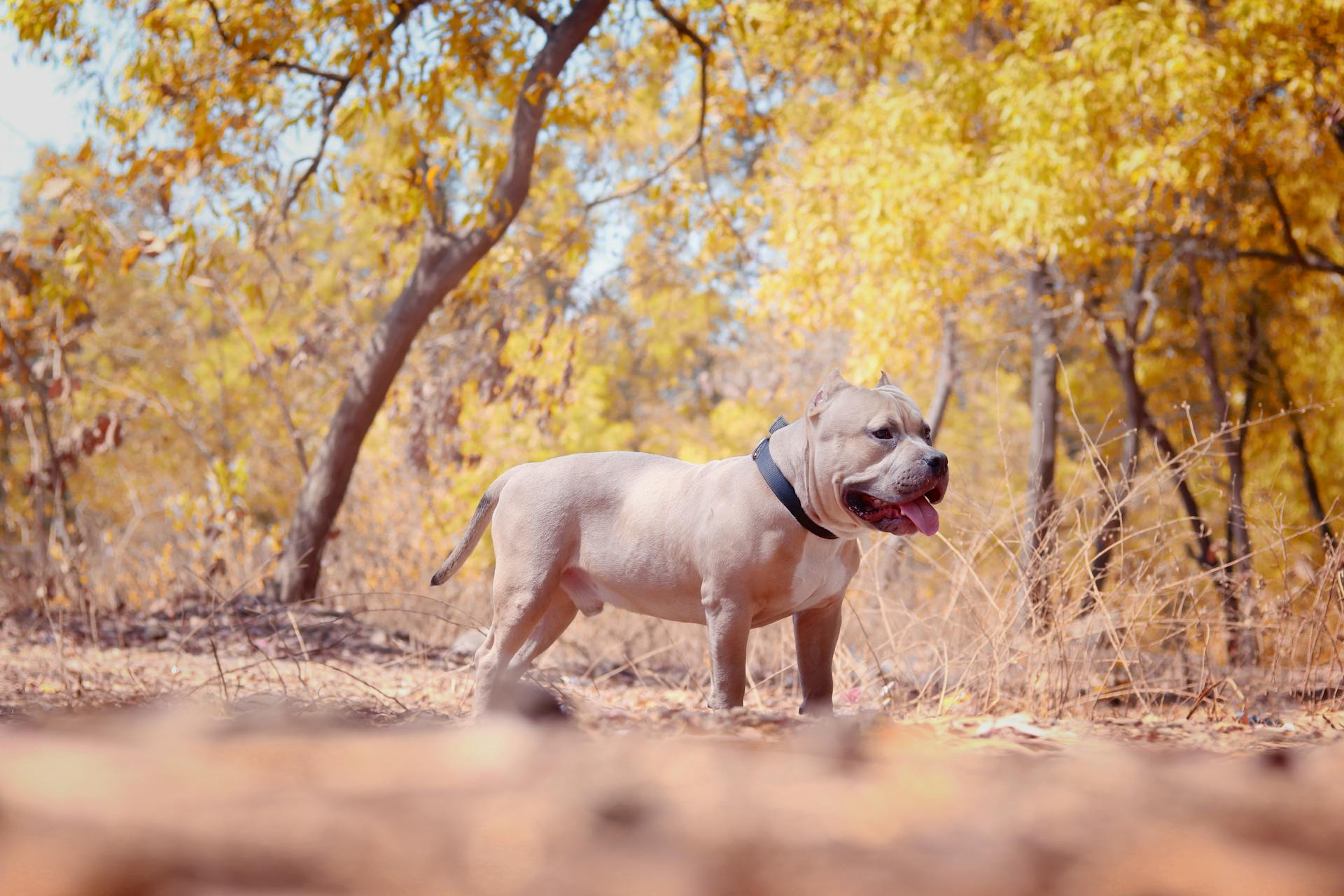
The American Bully is a muscular and athletic breed that requires a balanced diet to maintain their overall health and well-being. A high-quality dog food that meets their nutritional needs is essential.
Their dietary requirements are influenced by their ancestry, with a mix of English Bulldog, American Pitbull Terrier, and other breeds contributing to their unique characteristics. This blend of breeds means they can be prone to certain health issues, such as hip dysplasia and allergies.
To ensure they receive the nutrients they need, American Bullies require a diet rich in protein, moderate in fat, and low in carbohydrates. This can be achieved through a combination of meat-based protein sources and whole grains.
A well-balanced diet will also support their energy needs, with adult American Bullies requiring around 1,500-2,000 calories per day.
A different take: Raw Food for American Bully
Nutrition Basics
American Bullies thrive on high-quality protein sources, which are essential for muscle development and maintaining their robust physique. They need a diet rich in protein from sources like lean meats, fish, eggs, and chicken.
Healthy fats are vital for these dogs, providing energy and supporting healthy skin and coat. Omega-3 fatty acids, found in fish oil, can be particularly beneficial for their skin and joints.
Carbohydrates provide a source of energy for active American Bullies, and whole grains like brown rice, quinoa, and oats can be included in their diet. Adequate fiber promotes healthy digestion and can help prevent common digestive issues.
Essential vitamins and minerals, such as vitamin A, vitamin D, calcium, and phosphorus, are crucial for the overall health of your American Bully. These nutrients support bone health, immune function, and various metabolic processes.
American Bullies can weigh up to 45 kg, and their pronounced musculature needs constant replenishment with protein-rich food. A little "baby fat" does not harm the American Bully puppy, but overfeeding can lead to obesity and health problems.
Their metabolism changes as they get older, so it's essential to adjust the feeding schedule when your Bully is about a year old. Then give him a portion of his food twice a day, but no more.
American Bullies require a range of essential nutrients for optimal health, including vitamins, minerals, and sometimes supplements like omega-3 fatty acids or probiotics. Always consult with your veterinarian before introducing any supplements to your Bully's diet.
A balanced diet is crucial for American Bullies, and it's essential to avoid toxic foods like chocolate, grapes, raisins, onions, garlic, and xylitol. Be mindful of what your American Bully has access to in your home.
For your interest: Good Food for American Bully
Dog Feeding Chart
As you're planning to feed your American Bully, it's essential to understand the concept of a dog feeding chart. A dog feeding chart isn't just a simple measuring cup of food; it's a tailored-made feeding program that helps your pup get the right amount of food, calories, essential vitamins, and nutrients in every bite.
Every dog has unique dietary requirements, and American Bullies are no exception. They require nutritional strategies that cater specifically to their age-related and size-specific needs. This means that the dietary needs of an American Bully change as they transition from puppyhood to adulthood and into their senior years.
To create an effective feeding chart for your American Bully, you'll need to consider their size category and life stage. For example, American Bully puppies require a different feeding schedule than adult dogs, and senior dogs have unique nutritional needs as well.
Here's a general outline of the feeding schedule for American Bullies:
As your American Bully grows, their calorie needs change. For example, adult dogs require less calories and nutrients compared to puppy food, while senior dogs need a diet rich in key nutrients to support their changing bodies.
When it comes to portion control, it's essential to avoid free-feeding and instead divide your dog's daily portion into two or three meals to prevent overeating. Regularly monitor your dog's weight and adjust portions accordingly to maintain a healthy body condition.
Puppy Nutrition
Puppy Nutrition is crucial for American Bullies, and it starts with the right balance of proteins from birth. American Bullies thrive on high-quality protein sources, and a diet rich in protein helps maintain their robust physique.
Aim for puppy food that is packed with protein, such as real meat like chicken or beef, and look for ingredients like fish oil for healthy fats. Healthy fats provide a concentrated source of energy and support healthy skin and coat.
To ensure your American Bully puppy gets the nutrients they need, consider the following key nutrients:
- Protein: Essential for muscle development and maintaining a robust physique.
- Fat: Provides a concentrated source of energy and supports healthy skin and coat.
- Carbohydrates: Whole grains like brown rice, quinoa, and oats provide a source of energy.
- Fiber: Promotes healthy digestion and can help prevent common digestive issues.
- Vitamins and Minerals: Essential for overall health, including bone health, immune function, and metabolic processes.
Remember, always provide fresh, clean water for your American Bully, and consider splitting their daily food into a few smaller meals to keep their energy levels steady throughout the day.
Weaning Process (3-8 Weeks)
The weaning process for puppies is a critical period that can be a bit tricky, but with a gentle approach, you can set your furry friend up for a lifetime of good health.
Puppies typically start transitioning from their mother's milk to solid food around the 3-month mark, and this transition can take anywhere from 3 to 8 weeks.
At first, you'll want to mix in small amounts of high-quality puppy food with warm water or puppy milk replacer to create a nutrient-rich mush that your puppy will love.
This mush is often called puppy mush, and it may not look super appetizing to us, but trust us, it's a genius way to help your puppy get used to solid food at their own pace.
Puppies should be eating three to four smaller dry meals per day, with about 1 cup of feed per day.
As your puppy gets used to solid food, they may experience some digestive issues, such as runny stool, stomach pain, and changes in appetite.
Don't panic, this is completely normal and usually resolves on its own, but do keep a close eye on your puppy and consult with your vet if you notice any persistent problems.
Monitoring your puppy's digestive health during this phase is key, so be sure to keep an eye out for any signs of distress.
A different take: American Bully Food Recipe
Puppy Water Intake
Make sure your American Bully puppy always has fresh water to sip on throughout the day. You can keep a bowl of fresh water within their vicinity to make it easily accessible.
Typically, puppies require roughly half a cup of water every couple of hours. This can vary from pup to pup, but it's a good starting point.
Drinking fresh water aids in maintaining healthy digestion, which is essential for your puppy's overall health. Fresh water is a must-have for your puppy's digestive system to function properly.
Not only do they need water to quench their thirst, but it's also crucial during hot weather or periods of increased activity to prevent dehydration. Monitor their water intake during these times to ensure they're staying hydrated.
Feeding a Puppy
Feeding a puppy requires careful consideration of their nutritional needs, especially during the first few months of life. Puppies need a diet rich in protein to support their muscle growth and development.
A good quality puppy food should be packed with protein, such as chicken or beef, and contain healthy fatty acids like fish oil to support their skin and coat health. This is especially important for American Bullies, who are prone to skin problems.
Puppies need to be fed a balanced diet that includes whole grains or veggies to provide energy and fiber. Aim for a food that is high in protein, moderate in fat, and low in carbohydrates.
You should feed your puppy 3-4 times a day until they are about six months old, then you can gradually switch to twice a day. For example, at 2-4 months, American Bully puppies need 1-2 cups of food per day, split into 4 meals, and at 6-12 months, they need 2.5-4 cups of food per day, split into 3 meals.
Here is a rough guide to the feeding needs of American Bully puppies:
Remember to always consult with your veterinarian to determine the best feeding schedule for your puppy, as their nutritional needs may vary depending on their size, age, and activity level.
Frequently Asked Questions
Can American Bullies eat chicken?
American Bullies can safely eat cooked chicken as a healthy treat
How do I make my Bully muscular?
To build muscle in your Bully, focus on high-intensity exercises such as weight vest training, weight pulling and dragging, and spring pole exercises, which target multiple muscle groups at once. Regular cardio activities like swimming, treadmill or running can also complement your strength training for a well-rounded physique.
How many times a day should I feed my puppy Bully Max?
For the first couple months, feed your puppy Bully Max 3-4 times a day. After 3 months, switch to 2 meals a day, one in the morning and one in the evening.
Can I feed my American Bully ground beef?
Yes, American Bullies can eat ground beef as a nutritious and delicious addition to their meals, providing essential protein, amino acids, and fatty acids. Consult with a veterinarian for proper feeding guidelines and to ensure a balanced diet.
Sources
- https://www.hundeo.com/en/dog-breeds/american-bully/
- https://breedatlas.net/american-bully-feeding-chart/
- https://americanbully.com/blogs/news/the-best-diet-and-nutrition-for-american-bully-dogs
- https://medium.com/@aadiyogiteam/optimal-nutrition-for-american-bullies-crafting-a-healthy-diet-plan-21a152650277
- https://capcitybullys.com/blog/what-can-american-bullys-eat/
Featured Images: pexels.com


